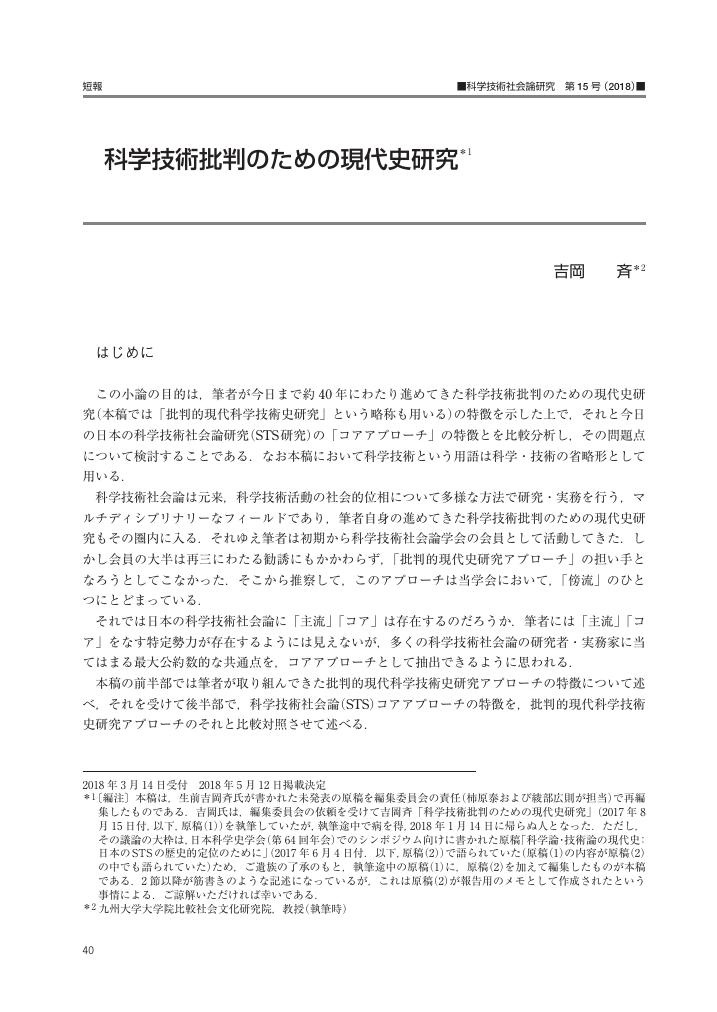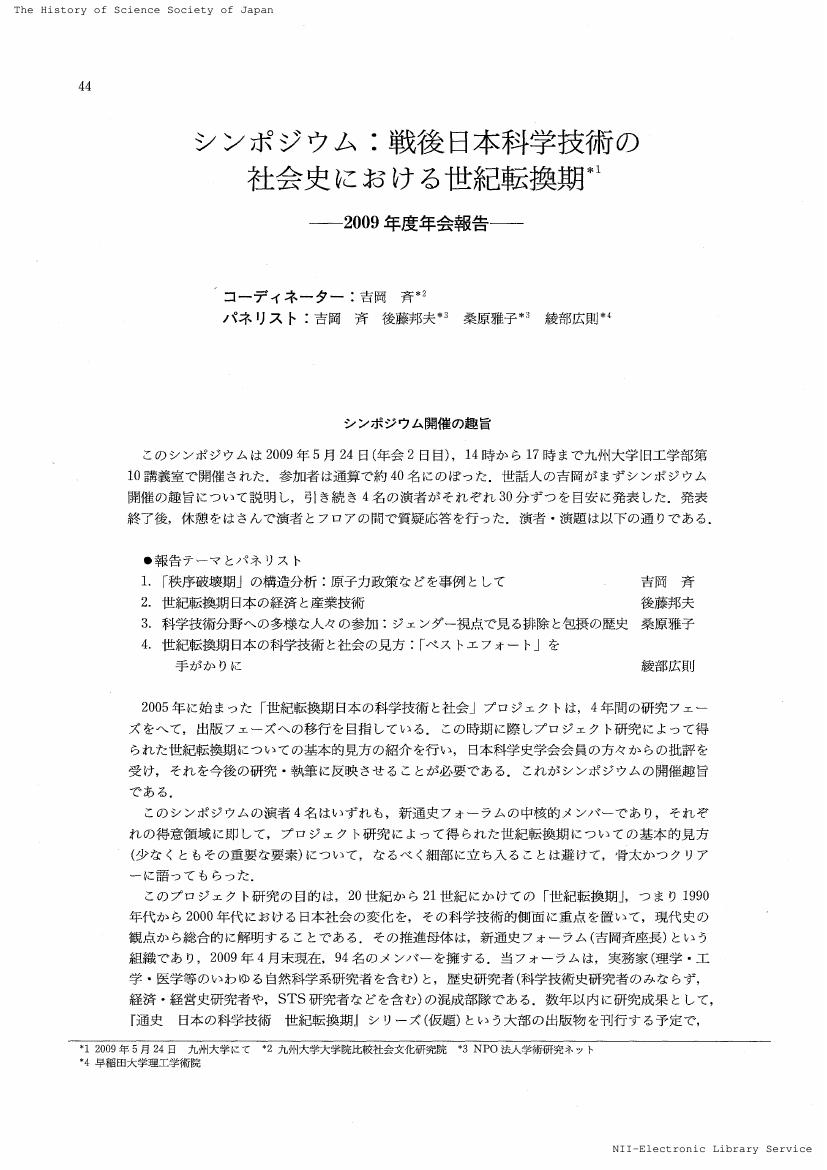11 0 0 0 OA 日本における原子力開発利用の民営化について
- 著者
- 吉岡 斉
- 出版者
- 国際日本文化研究センター
- 雑誌
- 現代生命論研究 = Recent Developments in Contemporary Life Studies
- 巻号頁・発行日
- vol.9, pp.273-282, 1996-01-31
6 0 0 0 1p-Z-2 パラダイム論の観点から見た原子力開発
- 著者
- 吉岡 斉
- 出版者
- 一般社団法人 日本物理学会
- 雑誌
- 日本物理学会講演概要集
- 巻号頁・発行日
- vol.53, 1998
2 0 0 0 OA 原子力市民委員会の目指すもの
- 著者
- 吉岡 斉
- 出版者
- 一般社団法人 日本原子力学会
- 雑誌
- 日本原子力学会誌ATOMOΣ (ISSN:18822606)
- 巻号頁・発行日
- vol.56, no.3, pp.188-189, 2014 (Released:2019-10-31)
2 0 0 0 OA 科学研究の社会的制御へ向けて
- 著者
- 吉岡 斉
- 出版者
- 社会・経済システム学会
- 雑誌
- 社会・経済システム (ISSN:09135472)
- 巻号頁・発行日
- no.5, pp.23-28, 1987-11-01
The concept of the 'open-system'is very useful in the sociology of science.This article has two main purposes.First, to propose an open-system model of modern scientific enterprise.And second, based on this model, to give a theoretical insight into the 'uncontrollableness'of modern science.According to this 'open-system'model, the most fundamental goal of scientific enterprise is to keep itself stationary.Robert Merton pointed out that the institutional goal of science is the extension of certified knowledge.However, the extension of knowledge is not the real goal of science, but the natural outcome of the operation of scientific knowledge production system.This system have to produce ever new and powerful knowledge constantly.As a result, scientific production system should be inherently expansive, or expansionist.Max Weber pointed out that our ability to control the conditions of our external world constantly increases with the advancement of scientific knowledge.In reality, the situation is quite the contrary;the scientific production system produces more uncontrollable power than power for control.To make matters worse, 'privatized science'has been growing rapidly.The greater part of scientific system is monopolized by powerful interest groups.Therefore, it is increasingly difficult to apply control over scientific production system.There are two main obstacles to control the scientific system;the inherent expansiveness and 'privatization'of this system.Therefore, it is very difficult to control the anarchistic power of science, unless we radically change the structure of the present scientific production system.
1 0 0 0 OA 科学技術批判のための現代史研究
- 著者
- 吉岡 斉
- 出版者
- 科学技術社会論学会
- 雑誌
- 科学技術社会論研究 (ISSN:13475843)
- 巻号頁・発行日
- vol.15, pp.40-46, 2018-11-20 (Released:2019-12-02)
- 参考文献数
- 3
1 0 0 0 OA シンポジウム:戦後日本科学技術の社会史における世紀転換期,2009年度年会報告
1 0 0 0 核時代とは何か (特集=科学者とは誰か)
1 0 0 0 核エネルギー研究のコンヴァージョンに関する研究
本研究の目的は、次の3つである。(1)冷戦終結後の世界の核エネルギー研究におけるリストラクチャリングの動向を概観すること。(2)リストラクチャリングにともなう研究資源(研究者、研究施設、研究資金など)のコンヴァージョンを促進するための主要国の政策について概観すること。(3)日本におけるリストラクチャリングおよびコンヴァージョン政策の在り方について、批判的分析を行うこと。コンヴァージョン政策が重要である理由は、2つある。第1は、リストラクチャリングの副作用を抑えること。第2は、コンヴァージョンの受け皿を用意することによって利害関係者の抵抗を弱めること。なお本研究では主として、民事利用の分析に力点を置いた。それは第1に、軍事利用分野に関しては世界的に調査が進んでいるからである。また第2に、日本の場合は軍事利用事業自体が存在しないからである。研究成果の相当部分はすでに出版されており、そのリストは報告書にある。代表的な3点のみを裏面に記す。主な研究の知見は次の3点である。(1)欧米諸国では周到なコンヴァージョン政策が不在であるにもかかわらず、リストラクチャリングは比較的順調に進んでいる。(2)それとは対照的に日本では、従来からの基本政策の見直しがいまだ実現しておらず、リストラクチャリングは限定的なものにとどまっている。その主要な原因は、日本の政策的意思決定機構の閉鎖性にある。そこでは当該政策の所轄官庁の利害が、過剰に保護されるのである。(3)リストラクチャリングを進めるためには、政策的意思決定機構の抜本的な改革が絶対的に不可欠である。それと同時に、適切で効果的なコンヴァージョン政策の立案が重要である。




